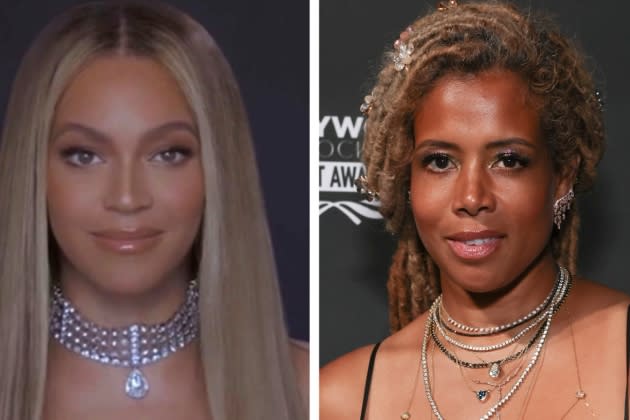
In the past 48 hours, the only noise louder than the Beyhive’s buzz has been coming from R&B singer Kelis, who is outraged that Beyonce sampled her 1999 song “Get Along With You” without informing her. The sample appears in the song “Energy” from Beyonce’s just-released album “Renaissance”; the officially credited writers and producers of “Get Along With You” are the Neptunes, a.k.a. Pharrell Williams and Chad Hugo, who are credited with most of Kelis’ early recordings, including her 2003 signature hit “Milkshake.”
In a long string of Instagram posts, Kelis writes, “It’s not a collab it’s theft. My mind is blown too because the level of disrespect and utter ignorance of all 3 parties involved is astounding… I heard about this the same way everyone else did. Nothing is ever as it seems, some of the people in this business have no soul or integrity and they have everyone fooled.”
More from Variety
There’s a lot to unpack here, professionally, personally and on a macro level.
From a legal standpoint, two veteran music-business attorneys tell Variety that it is possible but unlikely that Beyonce’s team would be contractually required to inform Kelis of the sample, even though she is the performing artist on “Get Along With You”: She is neither the credited writer of the work (which is Williams and Hugo) nor the copyright holder (Virgin Records, which is owned by Universal Music Group). Kelis seems to acknowledge this in a Friday Instagram video, where she says it should have been “human decency” for Beyonce to tell her she was sampling the song, although she added the situation was “really not about Beyonce.”
Going back 23 years, on both a personal and professional level, both Kelis and the Neptunes were at early stages in their careers when the song was released in December of 1999: While Williams and Hugo were in their mid-20s and a rising songwriter-production team with songs by Ol’ Dirty Bastard, MC Lyte, SWV, Clipse and others, Kelis was just 20. The three were close friends at the time. Kelis has said previously that she feels she was not properly credited or compensated for her work with the duo.
“I was told we were going to split the whole thing 33/33/33, which we didn’t do,” she told the Guardian in 2020. She says she was “blatantly lied to and tricked” by “the Neptunes and their management and their lawyers and all that stuff.” She said she didn’t initially notice that she wasn’t getting paid properly for her work on her first two albums, both of which the Neptunes produced, because she was making money from touring “and just the fact that I wasn’t poor felt like enough,” she says.
“Their argument is: ‘Well, you signed it,’” she continued. “I’m like: ‘Yeah, I signed what I was told, and I was too young and too stupid to double-check it.’”
While she said she hadn’t seen Hugo recently, she had seen Pharrell a few years before the Guardian interview at an industry event. “And he did that thing to me that he’s notorious for, which is making a nod from the stage [to someone in the audience], so it seems like there’s mutual respect, when in reality, I’m like, OK, I’m not going to yell back: ‘You stole all my publishing!’ So you end up nodding back and everyone thinks everything’s great. Like, whatever.”
Williams — who spoke at length about himself being on the wrong end of a publishing deal during his induction speech at the Songwriters Hall of Fame last month — has declined to discuss the situation with Kelis in the past and a rep for him did not respond to Variety’s request for comment. Hugo commented obliquely on the issue during an interview with Vulture earlier this year, saying “I heard about her sentiment toward that. I mean, I don’t handle that. I usually hire business folks to help out with that kind of stuff. We made some cool records back then with Kelis.”
The macro issue — who should be credited and paid for a song, and how much — goes back to the earliest days of copyright, if not creativity itself. Variety explored this issue at length last year in an article titled “Inside the Dirty Business of Hit Songwriting,” which shows that the practice of artists or business people taking credit or royalties for songs they did not write goes all the way back to the 1950s and, as depicted in the film 2020 “Ma Rainey’s Black Bottom,” much longer than that. While some instances are allegedly cut and dried — Elvis Presley’s manager and countless others have demanded a significant percentage of a song’s earnings, arguing that the money wouldn’t be rolling in without them — others are among the greyest of grey areas. More than 40 years after the song’s release, Procol Harum organist Matthew Fisher won songwriting credit and retroactive royalties for the 1967 smash “A Whiter Shade of Pale,” and countless other cases have been argued in and out of court. Williams found himself on the losing side of a songwriting lawsuit in the high-profile “Blurred Lines” case in 2015, when a jury ordered him, Robin Thicke and the song’s publisher nearly $5 million to Marvin Gaye’s family for infringing upon the late singer’s 1977 hit “Got to Give It Up,” a decision that was upheld in 2018, although Williams maintains that he doesn’t agree with it.
Kelis has a dozen or so songwriting credits, including her 2006 hit “Bossy,” which has been certified double platinum in the U.S. However, her claim in a Friday Instagram post that Williams “never wrote a song, a lyric a day in his life” is hyperbolic at best: With and without Hugo, Williams is one of the most successful songwriters and producers of the past 30 years, with songs like his own “Happy,” Britney Spears’ “I’m a Slave 4 U,” Beyonce’s “Work It Out,” Snoop Dogg’s “Drop It While It’s Hot” and dozens of others.
Who’s right? Who’s wrong? Only the people in the room know, and obviously memories differ. The upshot of this situation, all of the above and countless others is this: Make sure the credits and splits are clear before the song is released, because “human decency” will not hold up in court.
Best of Variety
Sign up for Variety’s Newsletter. For the latest news, follow us on Facebook, Twitter, and Instagram.




